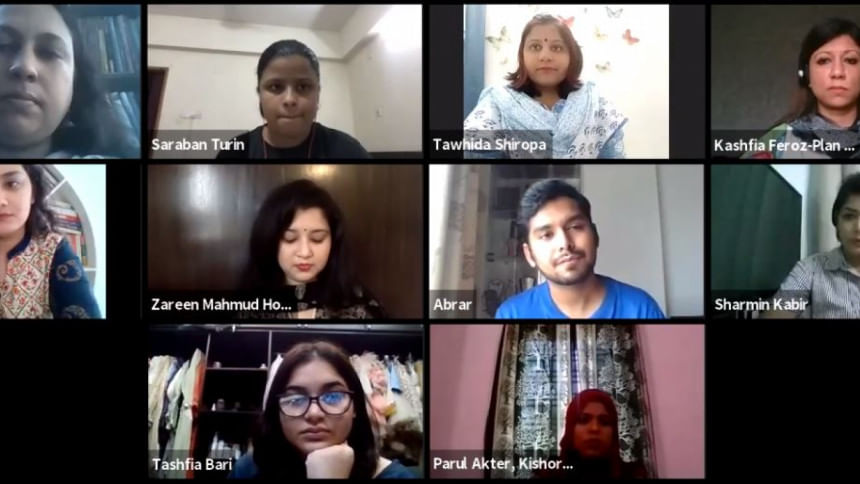Ensuring an equal world for the girl child

Commemorating International Day of the Girl Child with Star Youth, The Daily Star arranged a webinar titled, "Ensuring an equal world for the girl child." The webinar was broadcast live from The Daily Star's Facebook page, earlier today.
Moderated by Sarah Anjum Bari, In-charge, Daily Star Books, the panelists included Kashfia Feroz, Head of Influencing, Plan International, Zareen Hosein, Founder, HerStory Foundation, Sharmin Kabir, Founder, Wreetu.com, Tashfia Bari, Co-founder, Amader Skin, Saraban Turin, Country Director, Youth Hub and Founder, Turtle Venture, Tawhida Shiropa, Founder, Moner Bondhu, Parul Aktar, a child marriage survivor, Farida Yesmin, recipient of the Faraz Hossain Courage Award for stopping child marriage and Muhammad Abrar, Founder, Project Debi.
The theme of International Day of the Girl 2020 is, 'My voice, our equal future,' with an aim to reimagine a better world inspired by adolescent girls. In accordance with the theme, the panel discussion reflected on ensuring menstrual awareness, mental health precautions, societal perspectives about the girl child, patriarchal myths, beliefs and many other subjects.
The discussion started with Tashfia Bari, who started the Instagram handle, Amader Skin, encouraging people to open up about their personal battles with their skin conditions, weight, height, appearance and other issues. "In our society, the judgments we face regularly based on our appearances and other issues dangerously affects our self-esteem and confidence," shares Tashfia.
While the girls in our society are judged constantly for their diverse appearances, there are thousands of girls in rural areas deprived of far more basic rights.
"There are multiple myths regarding menstruation in our rural areas, which hinders a girl's growth process and affects their mental and physical health," says Sharmin Kabir, who founded Wreetu to create a community of health-conscious women and girls in Bangladesh and raise awareness about menstruation, reproduction and puberty. "We recently launched a Bangla comic book to aware and inform girls and boys in these rural areas about the importance of hygiene and menstrual health," shares Sharmin.
"After my SSC exam, my parents arranged my marriage, but I didn't want to get married, I wanted to continue my studies," shares Parul. With the help of her teachers and other well-wishers, Parul convinced her parents and called off the wedding. "A girl is also capable of becoming someone worthy in the society, if she has the willpower and courage, she can do anything she wants," says a hopeful Parul.
Unlike Parul, most girls in rural areas fail to escape this harsh reality. "If we want to ensure an equal society, we must stop child-marriage by all means," expresses Farida Yesmin. Even with so much support from the government and other institutions, we are still failing to stop child marriages in the country. "Society's deep rooted negative beliefs and discriminations among boys and girls are the main causes of child marriage," adds Farida.
"We need to value the opinions of the girls who have gone through different stages of oppression and discrimination, their voices are the ones that matter the most," says Kashfia Feroz. "We expect to see more young female leaders in the country and we encourage them to come forward and share their own personal experiences, which can ultimately bring positive changes in society."
"The patriarchal values and male-dominating ideologies hamper our progress towards an equal society," Kashfia further adds. "Girls and boys both face unfair discriminations due to such degrading values in society."
"We need to be careful about the language we use when we address the victims," shares Tawhida Shiropa, discussing the negative impact of media, when addressing rape or harassment victims. "We often use degrading language that allow us to signify the victim more than the criminals and this creates a negative attitude towards the victims." Shiropa's Moner Bandhu is a platform that provides psychological support, enabling people to have healthy relationships in life, through mutual trust, tolerance and respect.
Project Debi is conducting an online ideation contest to tackle misogyny at its core and they are working to incorporate more strong female figures in the education curriculum with NCTB. "We recently started to utilise our platform to initiate more conversations about sex education to create awareness against rape culture and harassments," says Muhammad Abrar. They also intend to provide legal and psychological counselling to sexual assault victims, by bringing lawyers and psychologists on board.
On a more positive note, over the years, HerStory Foundation has gifted us with several empowering stories, promoting female heroes of our history and daily lives. "When I went to a recent protest against rape, I saw several parents who brought their young girls in these protests and I believe even such parents can be heroes," says Zareen Hosein. HerStory Foundation plans to launch more heroic stories to further empower and inspire young girls across the country.
"We are all part of a positive eco-system," expresses Saraban Turin, reflecting on the recent positive changes different leaders are bringing in the society. "There are so many people working towards an equal society, including policy makers, entrepreneurs, story-tellers, social workers and activists. We are all working hand in hand to ensure a better world for the future generations."
The commendable efforts of these organisations and individuals provide hope of an equal world amid terrible, real circumstances. While our collective steps can help to change the world, the deep rooted gender discriminating values and beliefs are hindering our progress. With help and support from our government to ensure justice and equal rights, the panelists believe that a gender equal world can be achieved.

 For all latest news, follow The Daily Star's Google News channel.
For all latest news, follow The Daily Star's Google News channel. 



Comments